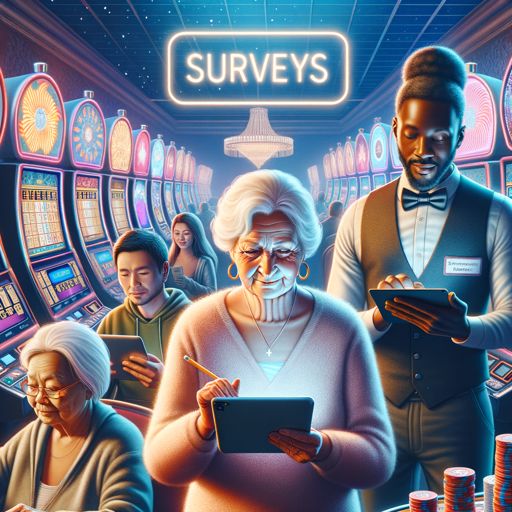Understanding Player Feedback in the Online Casino Industry
The online casino industry is one of the most dynamic and competitive sectors in the world of digital entertainment. With millions of players engaging daily on platforms like BetMGM, Caesars Casino, FanDuel Casino, and DraftKings Casino, operators are under constant pressure to deliver a seamless, enjoyable, and trustworthy experience. At the heart of continuous improvement lies one critical element: player feedback. This article delves deep into why player feedback matters, how it's gathered and analyzed, the challenges involved, and what the future holds for this vital process.
The best Australian online casinos provide top pokies, instant banking, and great rewards. They’re tailored to the local gaming market.
Importance of Gathering Player Feedback
Online casinos operate in a fast-paced environment where user expectations are continually evolving. The importance of gathering player feedback cannot be overstated—it's the lifeblood that informs operators about what works, what doesn’t, and where there’s room for improvement.
Enhancing User Experience
Player feedback provides direct insight into user experiences across all aspects of an online casino—from game selection to payment processing. For instance, if multiple users on BetMGM report laggy game performance or slow withdrawals, it signals a need for technical improvements or process optimizations. Operators can address these pain points quickly to retain players and boost satisfaction.
Regulatory Compliance and Trust
In regulated markets like New Jersey, Pennsylvania, Michigan, and West Virginia, casinos must adhere to strict guidelines set by authorities such as the New Jersey Division of Gaming Enforcement (NJDGE) or Pennsylvania Gaming Control Board (PGCB). Feedback often highlights issues related to responsible gambling tools or fairness in games—areas closely monitored by regulators. Addressing these concerns helps casinos maintain compliance and fosters trust among their player base.
Competitive Advantage

With so many options available—DraftKings Casino alone boasts hundreds of slots and table games—players can easily switch platforms if their needs aren’t met. By actively seeking out and acting on feedback, operators can differentiate themselves with superior customer service and innovative features tailored to their audience.
Methods for Collecting Feedback from Players
To harness the power of player feedback effectively, online casinos deploy a variety of methods tailored to different touchpoints within the user journey. Each method has its strengths and best-use scenarios.
In-Platform Surveys

Many leading US online casinos embed short surveys within their platforms. These surveys may pop up after a gaming session or during specific interactions such as making a deposit or withdrawal. Questions typically focus on ease of use, satisfaction with customer support, or opinions on recent promotions.
Customer Support Channels
Customer support teams serve as frontline collectors of feedback. Through live chat sessions, email correspondence, and phone calls, agents gather qualitative insights about player frustrations or suggestions. Casinos like Caesars Casino often record these interactions for training purposes but also analyze them for recurring themes.
Social Media Monitoring
Players frequently voice their opinions on social media platforms like Twitter, Facebook groups dedicated to casino gaming, or specialized forums such as Reddit’s r/onlinegambling. Monitoring these channels allows casinos to tap into unfiltered sentiment about new game launches or promotional campaigns.
Third-Party Review Sites
Websites like Trustpilot or Casino.org aggregate user reviews that can be invaluable for understanding broader market perceptions. These reviews often include detailed accounts of both positive experiences (such as fast payouts at FanDuel Casino) and negative ones (like confusing bonus terms at smaller operators).
| Method | Advantages | Best For |
|---|---|---|
| In-Platform Surveys | Targeted questions; real-time responses | Immediate post-interaction feedback |
| Customer Support | Qualitative insights; issue resolution | Deep dives into specific problems |
| Social Media Monitoring | Unfiltered opinions; trend spotting | Early detection of emerging issues |
| Review Sites | Broad market sentiment; competitive context | Benchmarking against other operators |
Analyzing Player Feedback Effectively
Collecting data is only half the battle—the real value comes from analyzing this information systematically to uncover actionable insights.
Quantitative Analysis
Casinos often use analytics tools to quantify survey results or support ticket trends over time. For example, if 40% of surveyed players mention difficulty finding live dealer games on DraftKings Casino’s app during a given month, this signals a potential navigation issue that warrants further investigation.
Key metrics commonly tracked include:
- Net Promoter Score (NPS)
- Customer Satisfaction Score (CSAT)
- Issue resolution times
- Frequency of specific complaints (e.g., withdrawal delays)
By monitoring these metrics regularly, management teams can prioritize improvements based on impact and urgency.
Qualitative Analysis
Beyond numbers lie rich stories within open-ended responses from players. Text mining techniques—using tools like sentiment analysis software—help categorize comments into themes such as “game variety,” “bonus transparency,” or “mobile usability.” Casinos may also conduct focus groups with VIP customers for deeper dives into nuanced issues that numbers alone can’t reveal.
Benchmarking Against Competitors
Understanding how one’s own platform stacks up against competitors is crucial in a crowded market. By comparing feedback themes across brands—for example, noting that FanDuel consistently receives praise for fast withdrawals while others lag behind—operators can identify unique selling points worth emulating or promoting more aggressively.
Implementing Changes Based on Player Feedback
Turning insights into action is where successful casinos distinguish themselves from average ones. Implementation requires structured processes involving cross-functional teams from product development to marketing.
Prioritizing Improvements
Not all feedback carries equal weight; casinos must prioritize based on factors such as frequency of complaints, severity of impact on user experience, regulatory risk exposure, and alignment with business goals. For instance:
- High Priority: Security vulnerabilities reported by multiple users
- Medium Priority: Requests for new slot titles
- Low Priority: Aesthetic preferences affecting only a handful of players
This triage ensures resources are allocated efficiently without overwhelming development pipelines.
Agile Development Cycles
Leading US operators like BetMGM employ agile methodologies to iterate quickly based on player input. This might involve releasing minor updates weekly—such as improving lobby navigation—or rolling out larger quarterly enhancements based on cumulative feedback analysis.
Some common changes inspired by player input include:
- Streamlining registration flows
- Expanding payment options (e.g., adding PayPal)
- Clarifying bonus terms
- Introducing new responsible gambling features
- Optimizing mobile app performance
Communicating Changes Transparently
Transparency builds trust—a key differentiator in regulated markets where consumer protection is paramount. Casinos should proactively communicate updates via email newsletters, blog posts within their platforms, or social media announcements detailing what’s changed in response to player suggestions.
Challenges in Player Feedback Management
While gathering and acting upon player feedback offers immense benefits, it’s not without significant hurdles that require strategic solutions.
Volume and Noise
Popular platforms like Caesars Casino receive thousands of data points daily—from quick survey responses to lengthy complaint emails—which makes filtering signal from noise challenging. Not every comment is actionable; some may reflect individual preferences rather than systemic issues.
Effective management strategies include:
- Automated tagging systems using AI
- Regularly scheduled manual audits by quality assurance teams
- Focusing on trends rather than isolated incidents
Balancing Conflicting Opinions
Players are diverse in preferences—what delights one group may frustrate another. For example, high rollers might request higher table limits while casual gamers seek lower minimum bets for inclusivity. Striking the right balance requires segmenting feedback by demographic profiles before implementing broad changes.
Regulatory Constraints
US online casinos must comply with state-specific regulations governing everything from payout speeds to responsible gambling measures. Sometimes player requests—for faster withdrawals or higher bonuses—may conflict with legal requirements enforced by bodies like the Michigan Gaming Control Board (MGCB) or West Virginia Lottery Commission.
Operators must ensure any changes align with local laws while still addressing core user concerns.
Future Trends in Player Feedback
As technology evolves and competition intensifies across states like New Jersey and Pennsylvania—where dozens of licensed brands vie for market share—the landscape of player feedback management is set for dramatic transformation over the next decade.
Real-Time Sentiment Analysis Using AI
Artificial intelligence is revolutionizing how casinos process massive volumes of unstructured data from chats, emails, social posts—and even voice calls via speech-to-text transcription services. Real-time sentiment analysis enables instant flagging of urgent issues (such as reports about malfunctioning games) so they can be resolved before negative word-of-mouth spreads widely online.
Benefits include:
- Faster response times
- More accurate trend detection
- Reduced manual workload for support teams
Personalized Engagement Based on Feedback Profiles
The next frontier involves tailoring offers—not just promotions but also UX/UI elements—to individual preferences inferred from past feedback submissions combined with behavioral analytics data. For example:
- Players who rate mobile navigation poorly might see simplified menus
- Those requesting more live dealer games could receive early access invitations when new tables launch
- High-value customers dissatisfied with bonus terms may get bespoke offers crafted by VIP managers at DraftKings Casino or FanDuel Casino
This hyper-personalization increases loyalty while reducing churn rates—a critical metric given high acquisition costs in regulated US markets ($300–$800 per new depositor according to Eilers & Krejcik Gaming research).
Blockchain-Based Transparency Tools
Emerging technologies like blockchain promise greater transparency around how player feedback influences decision-making processes within casinos—a major concern among skeptics wary about whether their voices truly matter. By logging every suggestion received along with subsequent actions taken onto immutable ledgers accessible by regulators (and potentially even players), trust can be further strengthened between all stakeholders in the ecosystem.
Key Takeaways: Elevating Online Casinos Through Player-Centric Innovation
Player feedback isn’t just another box-ticking exercise—it’s a strategic imperative shaping everything from product roadmaps to compliance practices at leading US online casinos such as BetMGM, Caesars Casino, FanDuel Casino, and DraftKings Casino. As digital gambling continues its rapid expansion across America—with total gross gaming revenue exceeding $5 billion annually according to the American Gaming Association—the ability to listen effectively will separate tomorrow’s winners from those left behind by shifting consumer expectations.
Summary checklist for effective player feedback management:
- Prioritize transparent collection through surveys embedded directly into casino apps/websites.
- Leverage advanced analytics tools—including AI-powered sentiment analysis—to distill actionable insights.
- Act promptly on recurring pain points while balancing regulatory obligations.
- Communicate openly about improvements made based on real user suggestions.
- Invest continuously in emerging technologies that personalize engagement at scale.
- Monitor competitive benchmarks using third-party review sites alongside internal metrics.
- Segment audiences thoughtfully when addressing conflicting needs among diverse user groups.
- Stay ahead by adopting innovations like blockchain transparency logs where feasible.
- Engage regulators proactively when implementing changes impacting compliance-sensitive areas.
- Celebrate wins publicly, reinforcing your brand’s commitment to being truly player-first!
By embedding these principles deeply into operational DNA—not just marketing slogans—America’s top online casino brands will continue building lasting relationships rooted in trust and mutual respect well into the future era of digital gaming innovation.